高考英语考点总结
- 格式:doc
- 大小:51.50 KB
- 文档页数:13
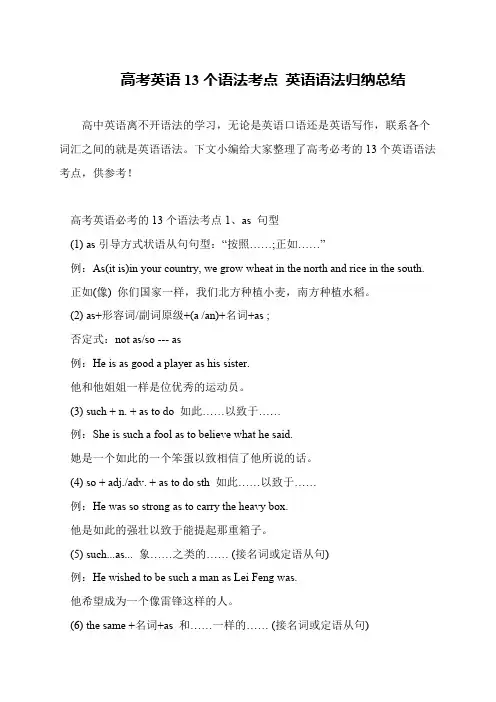
高考英语13个语法考点英语语法归纳总结高中英语离不开语法的学习,无论是英语口语还是英语写作,联系各个词汇之间的就是英语语法。
下文小编给大家整理了高考必考的13个英语语法考点,供参考! 高考英语必考的13个语法考点1、as 句型 (1) as引导方式状语从句句型:“按照……;正如……” 例:As(it is)in your country, we grow wheat in the north and rice in the south. 正如(像) 你们国家一样,我们北方种植小麦,南方种植水稻。
(2) as+形容词/副词原级+(a /an)+名词+as ; 否定式:not as/so --- as 例:He is as good a player as his sister. 他和他姐姐一样是位优秀的运动员。
(3) such + n. + as to do 如此……以致于…… 例:She is such a fool as to believe what he said. 她是一个如此的一个笨蛋以致相信了他所说的话。
(4) so + adj./adv. + as to do sth 如此……以致于…… 例:He was so strong as to carry the heavy box. 他是如此的强壮以致于能提起那重箱子。
(5) such...as... 象……之类的…… (接名词或定语从句) 例:He wished to be such a man as Lei Feng was. 他希望成为一个像雷锋这样的人。
(6) the same +名词+as 和……一样的…… (接名词或定语从句)。
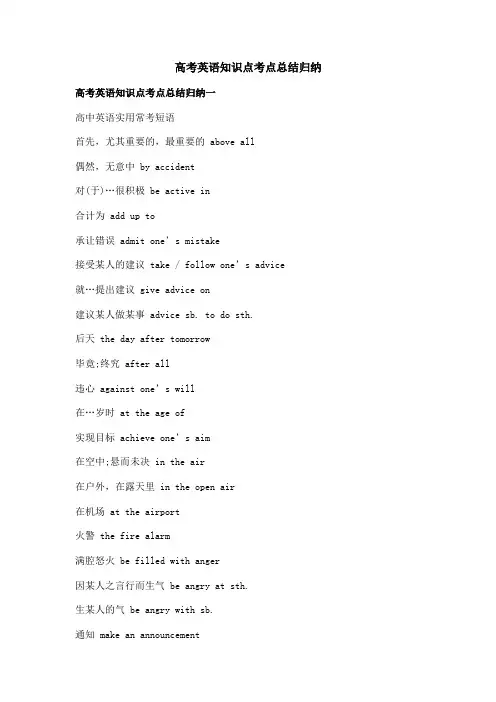
高考英语知识点考点总结归纳高考英语知识点考点总结归纳一高中英语实用常考短语首先,尤其重要的,最重要的 above all偶然,无意中 by accident对(于)…很积极 be active in合计为 add up to承让错误admit one’s mistake接受某人的建议take / follow one’s advice就…提出建议 give advice on建议某人做某事 advice sb. to do sth.后天 the day after tomorrow毕竟;终究 after all违心against one’s will在…岁时 at the age of实现目标achieve one’s aim在空中;悬而未决 in the air在户外,在露天里 in the open air在机场 at the airport火警 the fire alarm满腔怒火 be filled with anger因某人之言行而生气 be angry at sth.生某人的气 be angry with sb.通知 make an announcement相继地,按顺序地 one after another相互,彼此(三者或三者以上之间)one another相互(指两者之间) each other没有回答 give no answer2.考试必备重点单词短语形成…局面;产生 come into being安全带 a safety belt三思而后行。
Second thoughts are best.尽力,尽最大的努力do / try one’s best尽量利用,善用 make the best of一切顺利,万事如意 all the best黑体地,粗体地 in bold出身于农民家庭be born in a peasant’s family 鞠躬 make a bow动动脑子use one’s brains打破纪录 break the record深吸一口气 take a deep breath屏息;憋住气hold one’s breath上气不接下气 out of breath刷牙brush one’s teeth突然哭起来 burst into tears突然一阵大笑 a burst of laughter要不是 but for呼救声 a call for help保持镇静(别慌) keep calm保持安静(别吵) keep quiet保持不动(别动) keep still保持沉默(别说话) keep silent夏令营 a summer camp去野营 go camping情不自禁… cannot help doing打牌 play cards照顾,保管 take care of医疗护理 medical careanything but 一点也不anything like 像……那样的东西anywhere near 接近于apart form 除……之外尚有apply to 向……申请,适用于appreciation of 对……的欣赏argue against 反对as a result of 作为……的结果,由于高考英语知识点考点总结归纳二感叹句感叹句:一般是用来表示说话时的喜悦、惊讶等情感。
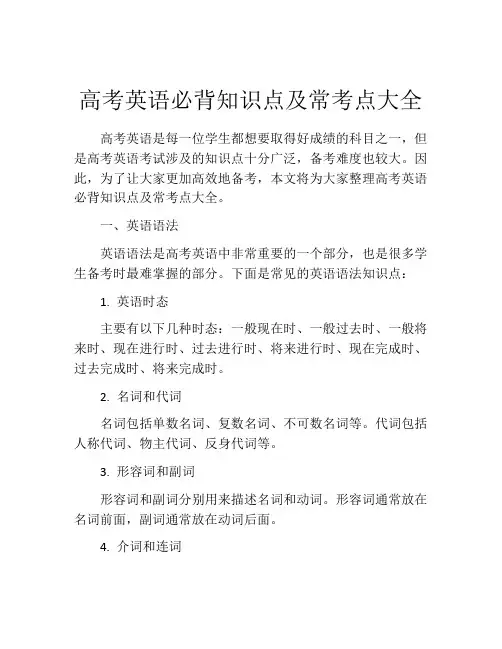
高考英语必背知识点及常考点大全高考英语是每一位学生都想要取得好成绩的科目之一,但是高考英语考试涉及的知识点十分广泛,备考难度也较大。
因此,为了让大家更加高效地备考,本文将为大家整理高考英语必背知识点及常考点大全。
一、英语语法英语语法是高考英语中非常重要的一个部分,也是很多学生备考时最难掌握的部分。
下面是常见的英语语法知识点:1. 英语时态主要有以下几种时态:一般现在时、一般过去时、一般将来时、现在进行时、过去进行时、将来进行时、现在完成时、过去完成时、将来完成时。
2. 名词和代词名词包括单数名词、复数名词、不可数名词等。
代词包括人称代词、物主代词、反身代词等。
3. 形容词和副词形容词和副词分别用来描述名词和动词。
形容词通常放在名词前面,副词通常放在动词后面。
4. 介词和连词介词和连词用来连接词语,介词通常放在名词或代词前面,连词用来连接词语或句子。
5. 句型常见的句型有陈述句、疑问句、祈使句、感叹句等。
二、词汇高考英语中,词汇量是很重要的一个方面。
下面是高考英语常见的词汇知识点:1. 同义词和反义词同义词指的是意思相同或相近的词,反义词则指的是意思相反的词。
2. 前缀和后缀前缀和后缀指的是词根前面或后面的一些字母,用来改变词义。
3. 词形变化词形变化指的是单数名词变成复数名词,动词变化成不同的时态等。
4. 词义辨析词义辨析指的是相似但细微差异的单词之间的区别,如effect和affect等。
三、阅读理解阅读理解是高考英语中的重头戏,通常占据比较多的分数,因此要认真准备。
下面是阅读理解需要注意的知识点:1. 词汇理解要能够正确理解课文中的词汇,而不是仅根据字面去理解,同时还要掌握一些固定的短语和表达方式。
2. 语法分析要能够正确理解课文中的语法结构,包括句子主谓宾、修饰语、同位语等。
3. 推理判断要能够根据课文中的信息进行推理和判断,并能够理解作者的观点和态度。
四、写作高考英语中的写作部分通常包括作文和翻译。
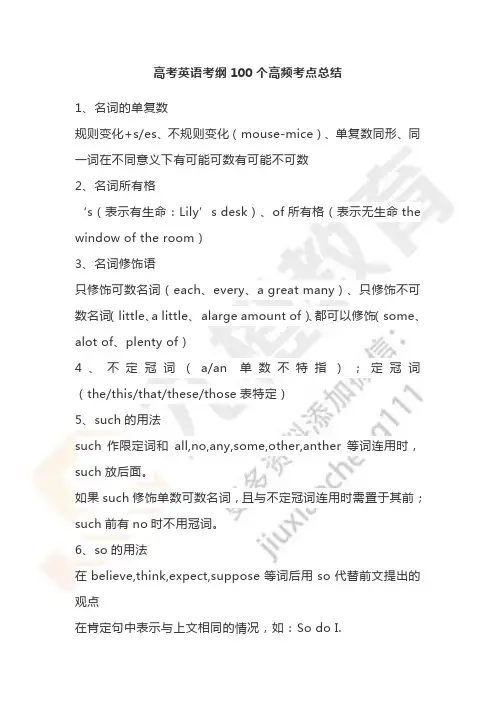
高考英语考纲100个高频考点总结1、名词的单复数规则变化+s/es、不规则变化(mouse-mice)、单复数同形、同一词在不同意义下有可能可数有可能不可数2、名词所有格‘s(表示有生命:Lily’s desk)、of所有格(表示无生命the window of the room)3、名词修饰语只修饰可数名词(each、every、a great many)、只修饰不可数名词(little、a little、alarge amount of)、都可以修饰(some、alot of、plenty of)4、不定冠词(a/an单数不特指);定冠词(the/this/that/these/those表特定)5、such的用法such作限定词和all,no,any,some,other,anther等词连用时,such放后面。
如果such修饰单数可数名词,且与不定冠词连用时需置于其前;such前有no时不用冠词。
6、so的用法在believe,think,expect,suppose等词后用so代替前文提出的观点在肯定句中表示与上文相同的情况,如:So do I.7、all和both的用法all三者或三者以上全部都,both二者都。
all指整体或抽象事物时当做单数,指人时当做复数。
both做主语时,谓语动词用复数。
8、many修饰或替代可数名词,much修饰或替代不可数名词many a 许多(谓语动词用单数)a good/greatmany很多as many as/asmuch as一样多、差不多9、little几乎没有,修饰不可数名词a little有一点,修饰不可数名词few几乎没有,修饰可数名词a few有一点,修饰可数名词耶鲁学姐笑笑说夜幕来领,你却不在身边#英文歌#英语歌曲#情感#英语视频号10、形容词比较级最高级原级比较:…is as good asmine.表示少于或超过另一方:fewer than, morethan易混淆短语:as well as也…既…as far as就…而言11、比较级常见错误:用much表强调时的误用She looks more younger than I.(×)She looks much younger than I.(√)12、介词短语重点except for除了in place of代替on behalf of代表but for要不是in front of在…前面13、介词across, over, through, past四个常考介词的区别across 横穿穿越,发生在物体表面over 跨过越过,发生在物体上方through 穿过,发生在某物空间内past 从旁经过14、易混淆的介词短语in all总共after all毕竟at all根本,常用在否定句中表强调above all最重要的是,尤其是15、序数词前一定要加定冠词the,改错常考,序数词与基数词连用时,序数词放在前面,如the first one。
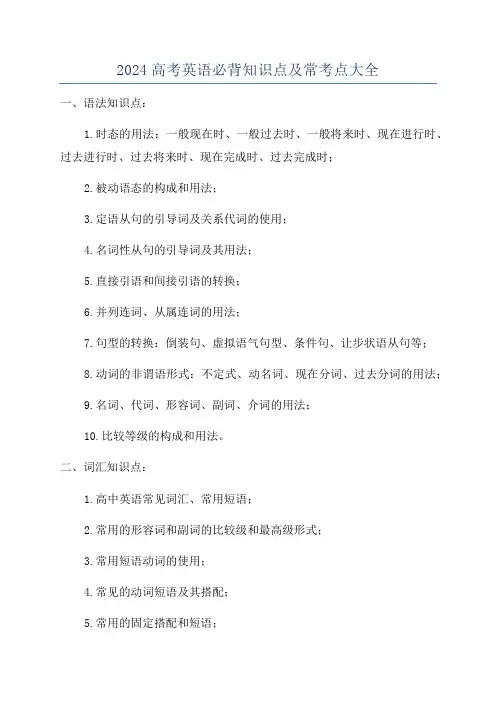
2024高考英语必背知识点及常考点大全一、语法知识点:1.时态的用法:一般现在时、一般过去时、一般将来时、现在进行时、过去进行时、过去将来时、现在完成时、过去完成时;2.被动语态的构成和用法;3.定语从句的引导词及关系代词的使用;4.名词性从句的引导词及其用法;5.直接引语和间接引语的转换;6.并列连词、从属连词的用法;7.句型的转换:倒装句、虚拟语气句型、条件句、让步状语从句等;8.动词的非谓语形式:不定式、动名词、现在分词、过去分词的用法;9.名词、代词、形容词、副词、介词的用法;10.比较等级的构成和用法。
二、词汇知识点:1.高中英语常见词汇、常用短语;2.常用的形容词和副词的比较级和最高级形式;3.常用短语动词的使用;4.常见的动词短语及其搭配;5.常用的固定搭配和短语;6.常用的形容词和副词的词义辨析;7.常用的同义词和反义词。
三、阅读理解知识点:1.阅读理解题型的特点及解题技巧;2.看图作文的写作方法;3.阅读理解中的细节题、推理题、主旨题、态度题的解题方法;4.阅读文章的整体理解能力;5.根据语境猜测词义的能力。
四、写作知识点:1.话题作文的写作思路和方法;2.议论文的写作结构及篇章组织方法;3.日记、书信、邀请函等文体写作方法;4.图画作文的写作技巧和常用句型;5.口头表达的技巧和常用句型。
五、听力知识点:1.听力题型的特点及解题技巧;2.长对话和短文听力的理解能力;3.根据听力材料获取信息的能力;4.根据听力材料进行推理的能力。
六、常见考点:1. 动词搭配:look forward to、take part in、get along with、pay attention to等;2. 名词单复数形式:sheep、fish、information、furniture等;3.冠词的用法:不定冠词、定冠词、零冠词;4.代词的指代关系、人称和数的一致性;5. 并列连词的用法:and、but、or、so、for、yet等;6.计算时间、距离、速度的表达方式;7.比较等级:原级、比较级、最高级。
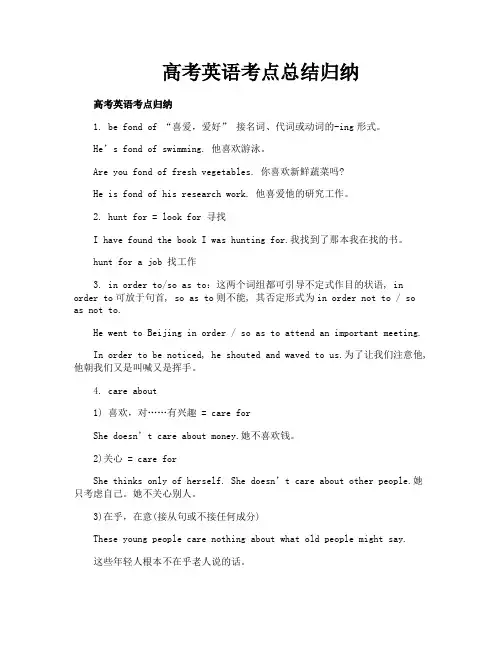
高考英语考点总结归纳高考英语考点归纳1. be fond of “喜爱,爱好” 接名词、代词或动词的-ing形式。
He’s fond of swimming. 他喜欢游泳。
Are you fond of fresh vegetables. 你喜欢新鲜蔬菜吗?He is fond of his research work. 他喜爱他的研究工作。
2. hunt for = look for 寻找I have found the book I was hunting for.我找到了那本我在找的书。
hunt for a job 找工作3. in order to/so as to:这两个词组都可引导不定式作目的状语, in order to可放于句首, so as to则不能, 其否定形式为in order not to / so as not to.He went to Beijing in order / so as to attend an important meeting.In order to be noticed, he shouted and waved to us.为了让我们注意他, 他朝我们又是叫喊又是挥手。
4. care about1) 喜欢,对……有兴趣 = care forShe doesn’t care about money.她不喜欢钱。
2)关心 = care forShe thinks only of herself. She doesn’t care about other people.她只考虑自己。
她不关心别人。
3)在乎,在意(接从句或不接任何成分)These young people care nothing about what old people might say.这些年轻人根本不在乎老人说的话。
5. such as 意为“诸如……”,“像……”,是用来列举人或事物的。
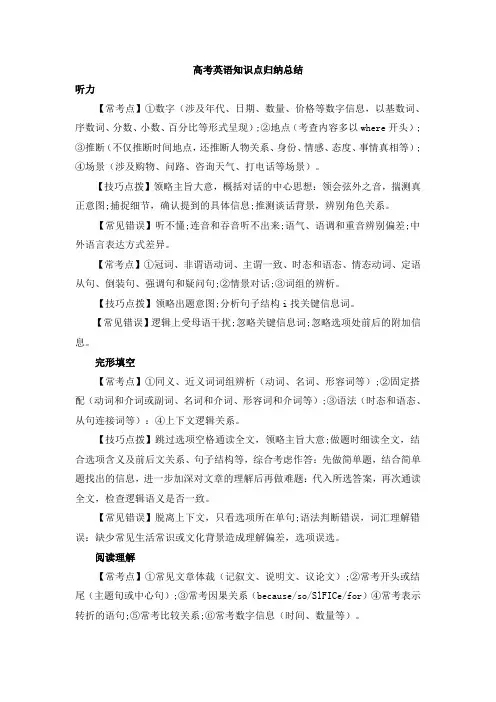
高考英语知识点归纳总结听力【常考点】①数字(涉及年代、日期、数量、价格等数字信息,以基数词、序数词、分数、小数、百分比等形式呈现);②地点(考查内容多以where开头);③推断(不仅推断时间地点,还推断人物关系、身份、情感、态度、事情真相等);④场景(涉及购物、问路、咨询天气、打电话等场景)。
【技巧点拨】领略主旨大意,概括对话的中心思想:领会弦外之音,揣测真正意图;捕捉细节,确认提到的具体信息;推测谈话背景,辨别角色关系。
【常见错误】听不懂;连音和吞音听不出来;语气、语调和重音辨别偏差;中外语言表达方式差异。
【常考点】①冠词、非谓语动词、主谓一致、时态和语态、情态动词、定语从句、倒装句、强调句和疑问句;②情景对话;③词组的辨析。
【技巧点拨】领略出题意图;分析句子结构i找关键信息词。
【常见错误】逻辑上受母语干扰;忽略关键信息词;忽略选项处前后的附加信息。
完形填空【常考点】①同义、近义词词组辨析(动词、名词、形容词等);②固定搭配(动词和介词或副词、名词和介词、形容词和介词等);③语法(时态和语态、从句连接词等):④上下文逻辑关系。
【技巧点拨】跳过选项空格通读全文,领略主旨大意;做题时细读全文,结合选项含义及前后文关系、句子结构等,综合考虑作答:先做简单题,结合简单题找出的信息,进一步加深对文章的理解后再做难题:代入所选答案,再次通读全文,检查逻辑语义是否一致。
【常见错误】脱离上下文,只看选项所在单句;语法判断错误,词汇理解错误:缺少常见生活常识或文化背景造成理解偏差,选项误选。
阅读理解【常考点】①常见文章体裁(记叙文、说明文、议论文);②常考开头或结尾(主题旬或中心句);③常考因果关系(because/so/SlFICe/for)④常考表示转折的语句;⑤常考比较关系;⑥常考数字信息(时间、数量等)。
【技巧点拨】重点读首尾段及带有转折词的句子,大致领略主旨大意;确定出题位置,做题时逐一去读和题干中有相似信息的语段,找出关键词以确定答案;若选项中的词汇看不懂且在正文中没有找到相同的词,根据上下文去揣测含义;代入选项,看文章是否合乎逻辑。
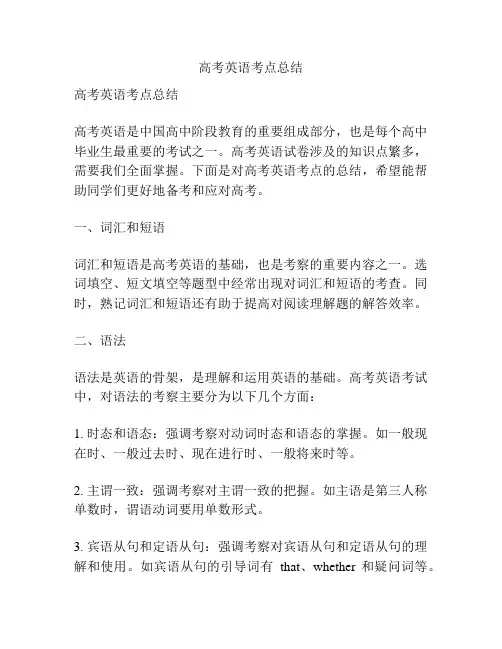
高考英语考点总结高考英语考点总结高考英语是中国高中阶段教育的重要组成部分,也是每个高中毕业生最重要的考试之一。
高考英语试卷涉及的知识点繁多,需要我们全面掌握。
下面是对高考英语考点的总结,希望能帮助同学们更好地备考和应对高考。
一、词汇和短语词汇和短语是高考英语的基础,也是考察的重要内容之一。
选词填空、短文填空等题型中经常出现对词汇和短语的考查。
同时,熟记词汇和短语还有助于提高对阅读理解题的解答效率。
二、语法语法是英语的骨架,是理解和运用英语的基础。
高考英语考试中,对语法的考察主要分为以下几个方面:1. 时态和语态:强调考察对动词时态和语态的掌握。
如一般现在时、一般过去时、现在进行时、一般将来时等。
2. 主谓一致:强调考察对主谓一致的把握。
如主语是第三人称单数时,谓语动词要用单数形式。
3. 宾语从句和定语从句:强调考察对宾语从句和定语从句的理解和使用。
如宾语从句的引导词有that、whether和疑问词等。
4. 被动语态和虚拟语气:强调考察对被动语态和虚拟语气的掌握。
如被动语态的构成和使用、现在虚拟语气的构成和使用等。
5. 并列和复合句:强调考察对并列句和复合句的理解和回答。
如并列句的连接词有and、but、or等。
三、阅读理解阅读理解是高考英语试卷中的重点和难点。
高考英语试卷中出现的阅读理解通常分为多篇短文和一篇长文。
对阅读理解的考察主要包括以下几个方面:1. 主旨大意:要求理解短文或长文的主旨大意。
2. 词义猜测:要求根据上下文推断生词和短语的词义。
3. 细节理解:要求理解短文中的细节信息。
4. 推理判断:要求根据短文中的信息进行推理判断。
5. 标题概括:要求根据短文内容给出标题或进行概括。
四、完形填空完形填空是高考英语试卷中另一个重要的阅读理解题型。
完形填空通过对一篇短文的填空题,考察学生对词汇、语法和上下文的理解能力。
五、任务型阅读任务型阅读是高考英语试卷中相对较新的题型,要求考生根据短文内容回答问题、完成任务或撰写简短的小作文。
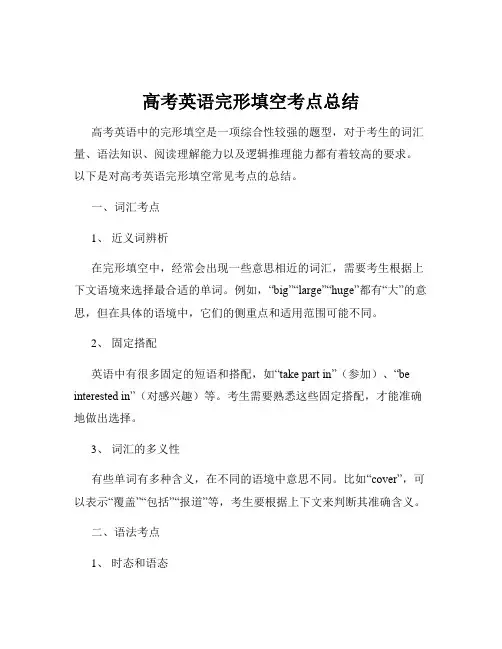
高考英语完形填空考点总结高考英语中的完形填空是一项综合性较强的题型,对于考生的词汇量、语法知识、阅读理解能力以及逻辑推理能力都有着较高的要求。
以下是对高考英语完形填空常见考点的总结。
一、词汇考点1、近义词辨析在完形填空中,经常会出现一些意思相近的词汇,需要考生根据上下文语境来选择最合适的单词。
例如,“big”“large”“huge”都有“大”的意思,但在具体的语境中,它们的侧重点和适用范围可能不同。
2、固定搭配英语中有很多固定的短语和搭配,如“take part in”(参加)、“be interested in”(对感兴趣)等。
考生需要熟悉这些固定搭配,才能准确地做出选择。
3、词汇的多义性有些单词有多种含义,在不同的语境中意思不同。
比如“cover”,可以表示“覆盖”“包括”“报道”等,考生要根据上下文来判断其准确含义。
二、语法考点1、时态和语态通过上下文来判断句子所需要的时态和语态是常见的考点。
例如,描述过去的事情要用过去时态,强调动作的承受者要用被动语态。
2、非谓语动词包括动词的 ing 形式、过去分词和不定式。
考生需要根据句子结构和逻辑关系来确定使用哪种非谓语形式。
3、从句定语从句、宾语从句、状语从句等在完形填空中经常出现。
考生要掌握各类从句的引导词和句子结构。
三、上下文逻辑关系1、转折关系常见的转折词有“but”“however”“yet”等。
当出现这些词时,前后的意思往往相反。
2、因果关系“because”“so”“therefore”等词提示因果关系,考生要根据原因或结果来选择合适的选项。
3、并列关系“and”“as well as”“bothand”等表示并列关系,所连接的成分在语义和语法上通常是平等的。
四、文化背景知识有时候,完形填空的文章会涉及到英语国家的文化、风俗、习惯等方面的知识。
例如,某些节日的庆祝方式、特定的社交礼仪等。
了解这些背景知识有助于更好地理解文章和做出正确的选择。
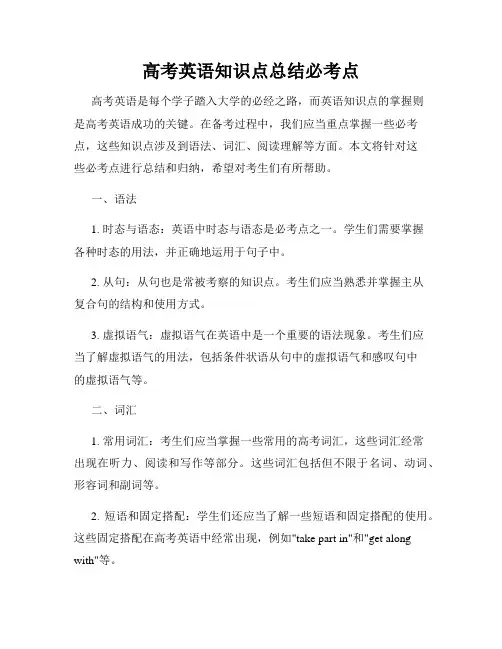
高考英语知识点总结必考点高考英语是每个学子踏入大学的必经之路,而英语知识点的掌握则是高考英语成功的关键。
在备考过程中,我们应当重点掌握一些必考点,这些知识点涉及到语法、词汇、阅读理解等方面。
本文将针对这些必考点进行总结和归纳,希望对考生们有所帮助。
一、语法1. 时态与语态:英语中时态与语态是必考点之一。
学生们需要掌握各种时态的用法,并正确地运用于句子中。
2. 从句:从句也是常被考察的知识点。
考生们应当熟悉并掌握主从复合句的结构和使用方式。
3. 虚拟语气:虚拟语气在英语中是一个重要的语法现象。
考生们应当了解虚拟语气的用法,包括条件状语从句中的虚拟语气和感叹句中的虚拟语气等。
二、词汇1. 常用词汇:考生们应当掌握一些常用的高考词汇,这些词汇经常出现在听力、阅读和写作等部分。
这些词汇包括但不限于名词、动词、形容词和副词等。
2. 短语和固定搭配:学生们还应当了解一些短语和固定搭配的使用。
这些固定搭配在高考英语中经常出现,例如"take part in"和"get along with"等。
3. 同义词和近义词:在阅读理解中,常有一些同义词和近义词的替换。
考生们应当注意这些替换,并通过积累和阅读来掌握这些同义词和近义词。
三、阅读理解1. 主旨大意:考生们在阅读理解中要能够准确把握文章的主题和中心思想。
通过仔细阅读文章,提取关键信息可以帮助考生们正确回答问题。
2. 推理判断:阅读理解中经常会出现一些需要考生们做推理判断的题目。
考生们应当结合文章内容进行推理,同时注意排除干扰选项,做出正确的判断。
3. 词义猜测:阅读理解中常会出现一些生词或不熟悉的词汇。
考生们需要根据上下文的暗示来猜测生词的含义,以便更好地理解文章。
四、写作技巧1. 格式与结构:英语写作需要符合一定的格式和结构要求。
写作时要注意段落的划分,掌握好开头、主体和结尾的写作技巧。
2. 句子连接词:写作时应当灵活运用句子连接词,使文章的逻辑性更加明确和流畅。
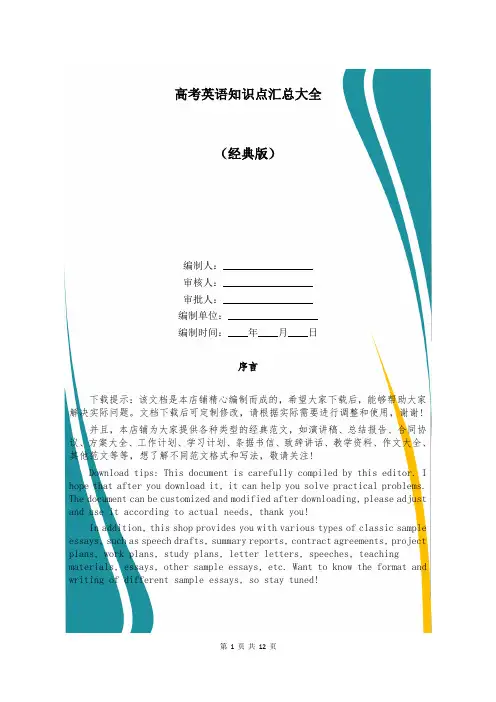
高考英语知识点汇总大全(经典版)编制人:__________________审核人:__________________审批人:__________________编制单位:__________________编制时间:____年____月____日序言下载提示:该文档是本店铺精心编制而成的,希望大家下载后,能够帮助大家解决实际问题。
文档下载后可定制修改,请根据实际需要进行调整和使用,谢谢!并且,本店铺为大家提供各种类型的经典范文,如演讲稿、总结报告、合同协议、方案大全、工作计划、学习计划、条据书信、致辞讲话、教学资料、作文大全、其他范文等等,想了解不同范文格式和写法,敬请关注!Download tips: This document is carefully compiled by this editor. I hope that after you download it, it can help you solve practical problems. The document can be customized and modified after downloading, please adjust and use it according to actual needs, thank you!In addition, this shop provides you with various types of classic sample essays, such as speech drafts, summary reports, contract agreements, project plans, work plans, study plans, letter letters, speeches, teaching materials, essays, other sample essays, etc. Want to know the format and writing of different sample essays, so stay tuned!高考英语知识点汇总大全每年到这个时候,就有很多高三学生来问我:“老师,高考英语考点都有哪些啊?”我知道大家的想法,无非是觉得知道考点,复习就能缩小范围,更省力,还能得高分。
最新高考英语语法十大必考点总结1.时态和语态时态和语态是高考英语中的重要考点。
时态包括一般现在时、一般过去时、一般将来时以及进行时等;语态包括被动语态和主动语态。
理解并正确运用常见的时态和语态是解答语法题的基础。
2.定语从句定语从句是高考英语中的考点之一、定语从句用来修饰名词,通常位于被修饰的名词之后。
理解定语从句的引导词(如that, which, who等)和从句的结构是解答定语从句题目的关键。
3.名词性从句名词性从句作为主语、宾语以及表语等,在高考英语中经常出现。
理解名词性从句的类型和结构,例如主语从句、宾语从句、表语从句等,以及从句的引导词(如that, whether, if)是解答名词性从句题目的关键。
4.强调句强调句是高考英语中的重要考点之一、强调句用来强调句子中的一些成分,通常使用it is/was, that, who等引导。
理解强调句的结构以及强调句中被强调成分的位置和变化是解答强调句题目的关键。
5.虚拟语气虚拟语气是高考英语中的考点之一、虚拟语气用来表示虚拟条件或假设,通常使用would, could, might等情态动词。
理解虚拟语气的使用条件和结构,例如与过去事实相反的虚拟语气、与现在事实相反的虚拟语气、与将来事实相反的虚拟语气等是解答虚拟语气题目的关键。
6.并列句和复合句并列句和复合句作为高考英语中的基本句型,经常出现在阅读理解和写作部分。
理解并正确使用并列句和复合句的结构、连接词以及句子间的逻辑关系是解答这类题目的关键。
7.比较级和最高级比较级和最高级是高考英语中的考点之一、理解并正确运用比较级和最高级的形式及其比较级和最高级前后的修饰语是解答这类题目的关键。
8.主谓一致主谓一致是高考英语中的常见考点。
理解并正确运用主谓一致的规则,例如当主语为单数时,谓语动词需用单数形式等,是解答主谓一致题目的关键。
9.介词和介词短语介词和介词短语作为高考英语中的常见考点,需要理解并正确使用常见的介词及其用法,以及介词短语在句子中的位置和作用。
英语高考常考知识点总结大全第一部分:语音辨音(5分)考点一:a,e,i,o,u五个元音字母的发音:注意元音字母在重读开音节、闭音节中的读音,非重读音节中的读音及特例情况:开音节有两种:1) 一种是在重读音节中元音字母之后没有辅音字母,叫绝对开音节。
如:go no me paper2) 另一种是在元音字母之后有一个辅音字母(r除外),而后面又跟上一个不发音的元音字母e,叫相对开音节。
如:home name face在重读开音节中,元音字母一律读它的字母音,即长音。
闭音节:以一个或几个辅音字母结尾(r除外),而中间只有一个元音字母的音节叫闭音节。
在闭音节中,元音字母一律读它的短音。
但是:a. 字母a1) 在/w/后常发短音[ﺪ] 如wash,what,want;2) 在water一词中,a发长音/ [ﺪ:];3) 在danger strange change中发/ei/;4) 在class can't father after中发/a:/b. 字母e在ever even eve 这三个单词中的发音分别为:/e/ /i:/ /i:/。
c. 字母i发/i:/ policeman machined. 字母o发/u/ woman /i/ women在m,n,v,th前发 /Λ / come,son,love,does,mothere. 字母u 发/i/ busy 不发音 build (built)考点二:以-ed结尾的单词的词尾正确读音;清辅音后读作/ t / .looked hoped浊、元音后读作/ d / cleaned answeredt,d之后加ed, ed读/ id /started decided考点三:以-s,-es结尾的单词的词尾正确读音;清辅音后读作/s/ .maps cakes浊、元音后读作/z / bananas dogs在/s/、/z/、/dƷ//∫/音之后读/ iz / classes bridges washes houses考点四:常见字母组合的读音;(字母组合包括:元音字母组合和辅音字母合)考点五:不符合读音规则的常用词的读音。
高考英语阅读理解常见考点汇总一、高考英语阅读理解常见考点概述1、主旨大意题考查对文章整体内容的理解和概括能力。
常见提问方式:What is the main idea of the passage? / What is the passage mainly about?解题技巧:关注文章开头、结尾段落,以及段落的首句和尾句,寻找主题句。
11 文章标题类主旨大意题要求根据文章内容选择最合适的标题。
注意标题要简洁、准确地概括文章主要内容。
12 段落主旨大意题针对某一段落,询问其主旨。
需结合段落内容,抓住关键信息。
2、细节理解题考查对文章具体细节的把握。
提问方式多样,如:Which of the following is true/false according to the passage? / What does the author mention?21 直接细节题答案可直接在文中找到对应的语句。
22 间接细节题需要对文中相关信息进行推理、计算或归纳。
3、推理判断题基于文章内容进行逻辑推理和判断。
常见问法:It can be inferred from the passage that / The author implies that31 推理结论类得出文章未直接表述的结论。
32 推理原因类分析造成某种情况的原因。
33 推理态度类判断作者或文中人物的态度。
4、词义猜测题猜测文中生词或熟词生义的含义。
常见形式:The underlined word “” probably means 41 根据上下文猜测利用语境线索推测词义。
42 根据构词法猜测分析单词的词根、前缀、后缀等。
5、观点态度题了解作者或文中人物对某事物的看法和态度。
例如:What is the author's attitude towards?51 积极态度表示支持、赞成、乐观等。
52 消极态度体现反对、批评、悲观等。
53 中立态度客观陈述,不偏不倚。
高考英语考点归纳高考英语是中国高中毕业生升入大学的重要考试科目之一,也是考生进入大学的门槛。
在高考英语考试中,考点占据了重要的位置。
了解和掌握考点对于高考英语的备考非常重要。
下面将详细介绍高考英语的考点,以帮助考生更好地备考。
1. 词汇考点词汇是英语学习的基础,在高考英语考试中也占据了重要的地位。
考生需要掌握常见的单词和短语,特别是与高考阅读理解和完形填空相关的词汇。
此外,考生还需要了解词义辨析、词形变化和词语搭配等方面的知识。
2. 语法考点语法是英语学习的重中之重,对于高考英语也是不可忽视的考点。
考生需要掌握常见的语法知识,包括动词时态与语态、介词与介词短语、连词与从句、形容词与副词的比较级与最高级等。
掌握好这些基本的语法知识可以帮助考生在高考英语中取得好成绩。
3. 阅读理解考点阅读理解是高考英语考试中最常见的题型之一,也是考生需要重点准备的考点。
考生需要通过阅读文章来回答相关的问题,包括主旨大意、细节理解、推理判断等。
为了加强对阅读理解的掌握,考生需要多做模拟试题和练习题,提高自己的阅读能力和理解能力。
4. 完形填空考点完形填空是高考英语考试中的另一个重要题型,也是需要重点准备的考点之一。
在这道题型中,考生需要根据短文的内容来选择合适的选项,使得整个短文通顺、连贯。
为了在高考英语中取得好成绩,考生需要多做完形填空的练习题,提高自己的语感和填空技巧。
5. 写作考点写作是高考英语考试中的重要部分,也是考生需要着重准备的考点之一。
考生需要熟悉不同类型的作文题目,包括议论文、应用文和图表作文等。
考生需要掌握好写作的结构和语言表达能力,以便在考试中写出流畅、准确的文章。
6. 听力考点听力是高考英语考试中的一个重要部分,也是需要重点准备的考点之一。
在听力考试中,考生需要听懂对话和短文,并回答相关的问题。
为了提高听力能力,考生需要多听英语材料,如英语歌曲、英语电影和英语新闻等。
此外,考生还需要做一些听力练习题,提高自己的听力理解能力。
高考英语考点总结标准化管理处编码[BBX968T-XBB8968-NNJ668-MM9N]高考英语必备(个人整理)1.TO one' s+情感名词Eg: TOmySUrPrise, Iiedidverywellinhispreviousjob.令我吃惊的是,他在之前的那份工作中也干的不错。
(TOOne, SSUrPriSe 是固定搭配)用于该结构的名词常见的有admiration(羡慕),amazement (惊奇),amusement (娱乐),annoyance (烦恼),astonishment (惊奇),delight (欣喜),despair (绝望),disappointment (失望),embarrassment (难堪),happiness (幸福),horror (恐怖),joy(高兴),PUZZIement (疑惑),regret (遗憾),relief (如释重负),SatiSfaCtiOn(满意),Shame (羞愧),SOrrOw(悲伤),SUrPrise(惊讶)等2.beside/besidesbeside是一个介词,表示在...的旁边,相当于by:而besides是一个副词,也可作介词,表示除了...还有...Eg:Don' t Stand beside me.不要站我旁边I am OUtgOing. Besides, I am helpful.我很外向。
此外,我还乐于助人。
besides 和 except 的区别都可解作“除……之外”但含义不同。
except表示“从所提到的人或事物中除去,即从整体中除去一部分”,表示递减的概念,含义是否定的。
besides表示“除了……之外,还有……”,指“在整体中加入一部分”,表示递加的概念,含义是肯定的。
试比较:(DWe all Went except him.除他之外,我们都去了。
(他没有去)®We all Went besides him.除他之外,我们大家也都去了。
高考的英语必考点资料整理总结同学们备考高考的时候,要对复习的知识点做系统的总结,才能让复习效率提高,所以总结一下英语必考点吧。
下面是为大家整理的关于高考的英语必考点资料整理,欢迎大家来阅读。
高中英语必备高考内容1.一般现在时:一般现在时大多用动词原形来表示。
Be\have在人称和数上应按自己的变化规则与主语保持一致。
其他动词若其主语是第三人称单数,则应按动词第三人称单数的变化规律变化。
(1)表示主语现在所处的状态及所具备的特征、性格、能力等。
Eg:They are both tired and hungry.(2)表示习惯性的,反复出现的动作与状态。
常用时间状语:always often sometimes now and then every day (3)表示客观事实或普遍真理。
Eg:The earth moves around the sun.(4)在时间状语从句和条件状语从句表示将来的动作。
Eg:If it doesn’t rain tomorrow,we will go climbing.(5)表示按规定预计要发生的动作,只限于go,come,leave,start,stay,return,begin等。
(6)在某些以have,there开头的句子中,用动词go,come的一般第1页共4页现在时表示正在发生的动作。
Eg:Here comes the bus!2.现在进行时:(1)表示说话时正在进行的动作;(2)表示即将发生的或按计划安排好的动作,多限于go,come,start,leave,return,arrive,stay,fly等表示运动方向的动词,句中往往有表示将来的时间状语。
(3)少数动词如go,come,leave,arrive,return,begin,do,die,lose等现在进行时可以表示预计即将发生的动作;(4)表示反复发生的动作。
3.以-ing和-ed结尾的形容词:以-ed结尾的形容词用来描述人的精神状态或人对事物的态度或感受;以-ing结尾的形容词有“令人......的”意思,常用来指物。
高考英语必备(个人整理)1、To one’s+情感名词Eg:To my surprise,hedid very well in his previous job、令我吃惊得就是,她在之前得那份工作中也干得不错。
( Toone’s surprise 就是固定搭配)用于该结构得名词常见得有admiration (羡慕), amazement (惊奇), amusement (娱乐),annoyance (烦恼), astonishment(惊奇), delight (欣喜),despair(绝望), disappointment(失望), embarrassment(难堪), happiness(幸福),horror (恐怖), joy(高兴), puz zlement(疑惑), regret (遗憾), relief (如释重负), satisfaction (满意), shame(羞愧), sorrow (悲伤), surprise (惊讶)等。2、beside/besidesbeside就是一个介词,表示在、、、得旁边,相当于by:而besides就是一个副词,也可作介词,表示除了、、、还有、、、Eg:Don’t standbesideme、不要站我旁边Iam outgoing、Besides,Iam helpful、我很外向.此外,我还乐于助人。
besides与except得区别都可解作“除……之外"但含义不同。
ﻫexcept表示“从所提到得人或事物中除去,即从整体中除去一部分”,表示递减得概念,含义就是否定得.ﻫbesides表示“除了……之外,还有……”,指“在整体中加入一部分”,表示递加得概念,含义就是肯定得。
ﻫ试比较:①Weall went except him、除她之外,我们都去了。
(她没有去)②We all went besides him、除她之外,我们大家也都去了。
(她也去了)3.See/look/ watchSee 瞧见了(强调瞧得结果)Didyou seeit?您瞧见了吗?Look 意为瞧,瞧(强调动作)Look at the blackboard、请瞧黑板。
Watch观瞧,注视(形容观瞧得内容比较精彩,比较有过程)watch a game/watch a fight瞧比赛,观瞧打斗(瞧得东西都比较有内容)常见短语:seesb doing sth(瞧见某人正在做、、、,doing作sb 得宾补)see sb dosth (瞧见某人做了、、、,强调瞧了整个过程)See a movie/ film瞧电影Look like瞧起来像、、、/Look for、、、寻找、、、/ have a look at瞧一瞧/lookat 瞧着(glare at 怒视/ stare at 盯着瞧/ glanceat一瞥)Watch TV瞧电视look out= watch out 担心,小心4.Hear/listenListen 不及物动词,表示有意识地听、仔细听,强调得就是听得动作Listen to music听歌Listen to me、听我讲。
Hear及物动词,强调听得结果I can’t hearyou!我听不见您。
5.So/suchsuch与so得意思都就是“如此,这样"、但两者用法根本不同,与what与how引导得感叹句相类似、ﻫ1、such后面主要就是修饰名词、即:such+a/an+adj、+n、或a/an+such+adj、+n、、如果名词就是不可数名词或复数名词,则不可以用不定冠词a或an、如:ﻫ①Hehas such abeautiful bike、We all go to see it、②It's a such fine day、We all want to goto fly a kite、ﻫ2、so后面只能跟形容词或副词、即:与so+adj、或adv、不过,so后面也可以跟名词,但该名词必须就是单数可数名词、用法为:so+形容词+a或an+单数可数名词、如:ﻫ①The tiger issobig、And the cat issosmal l、ﻫ②She is so lovely a girl、ﻫ3、它们后面还可以与that从句连用、即:such…that与so…that意思就是“如此……以致……”、如:ﻫ①She is such a clevergirl that shecan make much progress in math exam、ﻫ②Hisbrotheris so youngthat he can't go to school、ﻫ注:当名词前得形容词为表示数目得词时,such必须换成so、如:①There aresomanypeople that we can'tgo past、ﻫ②I ate so much food thatIdidn't want to goany farther、ﻫ6.how/what (how about= what about、、、怎么样?)what、how常用于感叹句感叹句一般就是用来表示说话时得喜悦、惊讶等情感.英语感叹句常用”what”与”how"引导,"what"与"how”与所修饰得词置于句首,其它部分用陈述句语序。
一、由"what”引导得感叹句:"what"意为"多么"用作定语,修饰名词(被强调部分),单数可数名词前要加不定冠词a/an,复数可数名词或不可数名词前不用冠词。
这类句子得结构形式就是: ﻫwhat+(a/an)+adj、+n、+主语+谓语+(it is)、如:① What aclever girl sheis!多么聪明得姑娘呀! ﻫ②What an interesting storyit is!多么有趣得故事呀!③What deliciousfoodit is!ﻫ多么有味得食物呀!ﻫ二、由”how"引导得感叹句:"how”意为"多么",用作状语,修饰形容词或副词(被强调部分)。
如果修饰形容词,则句中得谓语动词用系动词;如果how修饰副词,则句中得谓语动词用行为动词,这类句子得结构形式就是:ﻫHow +adj、(adv、)+主语+谓语+(it is)、如:① How cold itis today!ﻫ今天多么冷呀!ﻫ②Howwell she sings!ﻫ她唱得多好呀!ﻫ三、在表示同一意义时,英语感叹既可用"w hat”引导,也可用"how”引导.如:① What a hot day it is! = How hot the day is ! ﻫ多么热得天气呀!②What bad weatheritis!= How bad the weatheris!多么糟糕得天气呀!四、What doyou do?您就是做什么得Howdo youdo it?您就是怎样做得7、Sometimes,sometime与some time得区别(1)sometimes得意思就是“有时",就是副词、例如:Sometimes he esbybike andsometimes bybus、她有时骑车来,有时乘公共汽车来、ﻫ(2)sometime也就是副词,意思就是“在某个时候”、可用于一般过去时与将来时、例如:Youcan hand in your homework sometime beforeFriday、您可以在周五前某个时候交作业、ﻫ(3)some time就是名词短语,它得意思就是“一段时间”、例如:I'll be awayfor some time、我将离开一段时间、8.表示“非常多”修饰可数名词复数或不可数名词不可数名词前可用:much, alittle, a great dealof, a large amount of可数名词前可用:many, a few,agreat many,a large number of既可以修饰可数名词又可以修饰不可数名词得有:lotsof,a lot of,plentyof,a great quantityof、9.another,the other,other, others、another(三个及以上之中)另一个the other(两个中)另一个ﻫother +n(other 就是一个形容词)others n、=other+n(pl、)Eg:I am sorry,but can you give me another chance?Peter has two sons、One issixandtheother isjust twoyears old、We need to care about other people= weneed tocare about others、10.就近原则:1、There be 句型Thereis abook andsome pencils onthedesk、=There aresomepencils and abo ok on the desk、2、neither、、、nor、、、Neitheryou nor he is right、= Neither he nor youareright、3、either、、、or、、、Either theyor Jim is going to Shanghainext Saturday、=Either Jim or they are going to shanghai nextSaturday、4、notonly、、、butalso、、、Notonly Ann but also her parents stay at home every Sunday、ﻫ= Not only Ann’sparents but alsoshe staysat home everySunday、就远原则有一类连接词,其后得谓语动词要与连接词前一部分得主语保持一致、此类连接词有with,along with,together with,as well as,besides,like,without,except (but),including等、例如:Lisa,as wellas her parents,was invited byJack、丽萨与爸妈都被邀请了!ﻫTracy,likemany girls,loves dancing、特蕾西像很多女孩一样,喜欢跳舞、ﻫAll the students,including Tom,areleaving、所有得学生,包括汤姆都走了、No one except(but)me knows aboutthis news、除了我没有人知道11.关于元音字母与元音音节元音字母总共有五个a eio u但决定用冠词 a 还就是an取决于后面得单词首字母就是不就是元音因素(1)、A book,ausefulbook, a European country,auniversity, aunique man、【这些单词中得U都发[ju:],这就是一个辅音音节】(2)、Anumbrella,an apple,an hour,an honest man 【h不发音】12.星期与月份(week/month)Monday星期一Tuesday 星期二Wednesday星期三Thursday星期四Friday 星期五Saturday星期六Sunday 星期天January一月February 二月March 三月April 四月May 五月June 六月July 七月August八月September 九月October 十月November 11月December12月JamesPaul McCartneywas born in 1942、James Paul McCartney was bornin June 18th,1942、13.时间得读法What time isit now?-—-Itis9:00 /9:05/9:15/ 9:30/9:45now、Nine o’clock/ nineo five/ ninefifteen(aquarterpast nine)/nine thirty(half pastnine )/ nine forty-five(a quarter to ten)一分钟a minute一秒asecond一小时an hour 一刻钟a quarter14.方位与位置East south west north center right leftSoutheast southwest _______(东北)________(西北)in表示A地在B地范围之内。